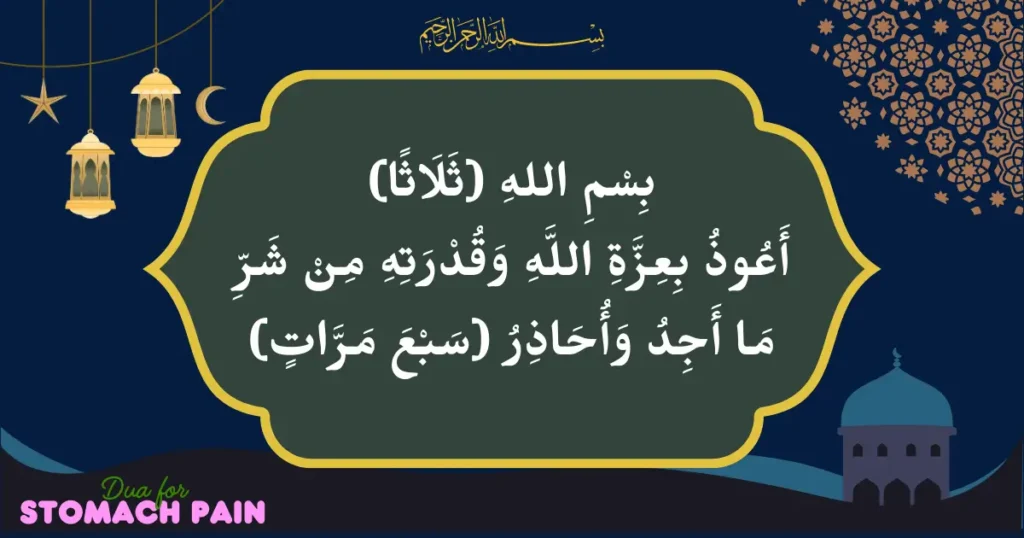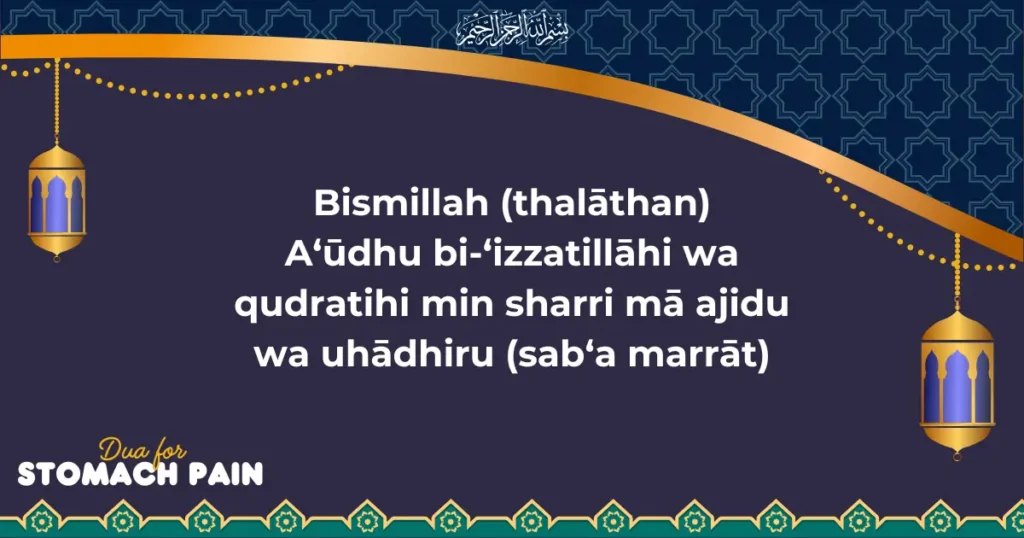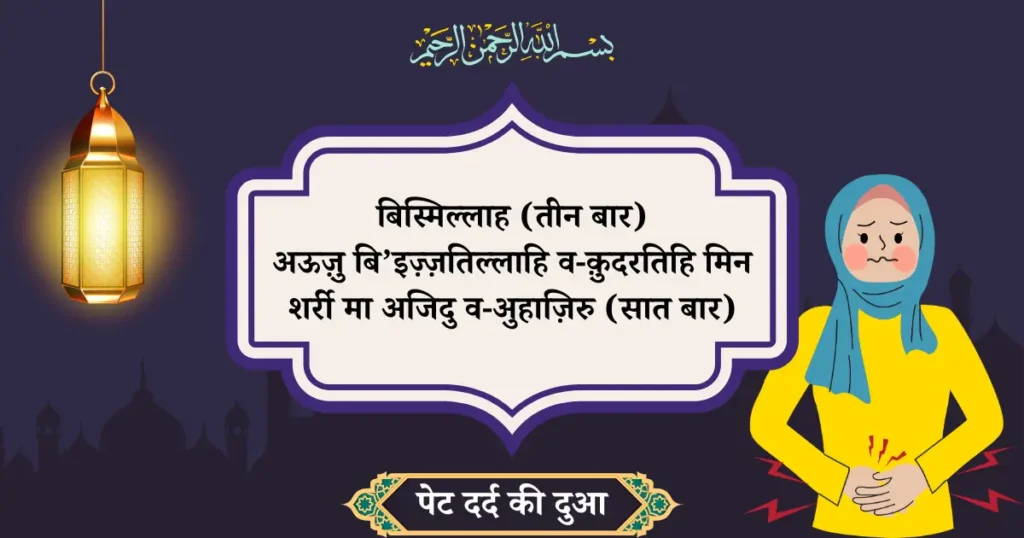Stomach pain can be both physically and emotionally distressing. In Islam, we recognize that our struggles—whether big or small—are tests from Allah, and they offer opportunities for spiritual growth and expiation of sins. For those seeking relief from stomach pain in Islam, turning to Allah through specific duas (supplications) can bring comfort, healing, and renewed faith. In this article, we’ll explore the dua for stomach pain, its significance, and how to incorporate it into your daily life alongside practical measures to promote overall well-being.
The Islamic Perspective on Stomach Pain
From an Islamic standpoint, illnesses and ailments—such as stomach pain—are not merely random occurrences. They serve as tests from Allah that remind us of our dependence on Him. Through these hardships, our sins can be forgiven, and our faith can grow stronger when we turn to Allah for help.
“And We will surely test you with something of fear and hunger and a loss of wealth and lives and fruits, but give good tidings to the patient.” (Qur’an 2:155)
Stomach pain, like any other ailment, can act as a means of purifying the heart and soul when met with patience and steadfastness. As believers, we are encouraged to seek both spiritual and practical remedies to overcome such hardships.
The Power of Dua for Healing
Dua is an essential aspect of a Muslim’s relationship with Allah. It is a direct line of communication—an opportunity to express our needs, hopes, and fears. Many Quranic verses and hadiths emphasize the importance of turning to Allah in times of distress:
“Call upon Me; I will respond to you.” (Qur’an 40:60)
When experiencing pain or illness, making dua helps us feel comforted and supported. It reminds us that we are not alone, and that Allah’s mercy and power encompass every difficulty we face.
The Comprehensive Dua for Stomach Pain
One of the most commonly cited Islamic duas for stomach pain involves seeking refuge in the power and might of Allah. According to a narration from the Prophet Muhammad (peace be upon him), one may place their hand on the affected area and recite:
Arabic Text
بِسْمِ اللهِ (ثَلَاثًا)
أَعُوذُ بِعِزَّةِ اللَّهِ وَقُدْرَتِهِ مِنْ شَرِّ مَا أَجِدُ وَأُحَاذِرُ (سَبْعَ مَرَّاتٍ)

Transliteration
Bismillah (thalāthan)
A‘ūdhu bi-‘izzatillāhi wa qudratihi min sharri mā ajidu wa uhādhiru (sab‘a marrāt)

English Translation
“In the Name of Allah (three times).
I seek refuge in the Might of Allah and His Power from the evil of what I feel and what I fear (seven times).”
Explanation of Meaning
- Bismillah (In the Name of Allah): By starting with the name of Allah, we acknowledge that all healing and relief come from Him alone.
- I seek refuge in the Might of Allah…: We affirm that Allah’s strength and authority have the power to remove any harm or affliction.
Reciting this dua with conviction can bring healing and comfort to those suffering from stomach pain or any other ailment.
Additional Quranic Verses and Duas for Relief
In addition to the dua for stomach pain, there are several other Quranic verses and duas that can be recited for overall healing and protection:
- Surah Al-Fatiha (1:1-7): Often called the “Opening” of the Quran, Al-Fatiha is known for its healing properties and is used in Ruqyah (Quranic recitation for protection and cure).
- Ayatul Kursi (Qur’an 2:255): This powerful verse highlights Allah’s supreme authority and protection over His creation.
- Last Three Surahs (Al-Ikhlas, Al-Falaq, and An-Nas): Reciting these chapters regularly offers protection from various forms of harm and negative influences.
- General Dua for Health: Allahumma ‘āfinī fī badanī, Allahumma ‘āfinī fī sam‘ī, Allahumma ‘āfinī fī basarī
O Allah, grant me health in my body, O Allah, grant me health in my hearing, and O Allah, grant me health in my sight.
By incorporating these verses and duas into your daily routine, you can seek relief from stomach pain in Islam while simultaneously nurturing your spiritual connection to Allah.
Step-by-Step Guidance for Daily Practice
If you or a loved one is experiencing stomach pain, here’s a simple method to incorporate dua for healing into daily life:
- Perform Wudu (Ablution): Begin in a state of cleanliness to enhance spiritual focus and reverence.
- Choose a Quiet Space: Find a calm area where you can concentrate on your recitation without distractions.
- Place Your Hand on the Painful Area: According to a hadith, touching the affected region while making dua can intensify the supplication’s impact.
- Recite “Bismillah” Three Times: This invokes the name of Allah and prepares your heart for the supplication.
- Recite the Dua Seven Times: A‘ūdhu bi-‘izzatillāhi wa qudratihi… Focus on the words and their meaning.
- Blow Gently on the Affected Area: This act symbolizes transferring the blessings of the dua onto the body.
- Optional: Recite Over Water: You may also recite the dua or Quranic verses over water and then drink it, seeking Allah’s blessing in the healing process.
Practical Tips for Managing Stomach Pain
While Islamic dua for stomach pain is a powerful spiritual remedy, it’s also essential to take practical steps to address the discomfort:
- Consult a Medical Professional: Seek a doctor’s advice to diagnose and treat any underlying conditions.
- Follow a Healthy Diet: Avoid foods that trigger stomach pain, such as spicy or highly acidic dishes.
- Stay Hydrated: Drink enough water throughout the day to aid digestion and overall health.
- Eat Moderate Portions: Overeating can exacerbate stomach pain, so opt for smaller, balanced meals.
- Get Adequate Rest: Proper sleep supports your body’s natural healing processes.
By combining dua for health with responsible self-care, you acknowledge both your spiritual and physical well-being.
The Power of Faith and Trust in Allah
It’s crucial to remember that true healing comes from Allah. Even when we follow medical advice and take all necessary precautions, our ultimate reliance should be on the One who created us. This reliance cultivates a deep sense of peace, knowing that Allah is our source of strength and recovery.
Conclusion: Embracing Dua as a Source of Strength
Stomach pain may be a test, but it also offers an opportunity to grow closer to Allah. By making dua for stomach pain, reciting Quranic verses for healing, and taking practical steps to care for our bodies, we can find comfort and hope. As Muslims, our faith teaches us that through patience, perseverance, and reliance on Allah, any hardship can become a source of spiritual elevation and purification.
Whether you’re seeking relief from stomach pain in Islam or simply want to fortify your spiritual practice, remember that Allah is always near. Use these duas and tips as both a solace for your immediate discomfort and a path toward a more profound connection with your Creator.
May Allah grant us all good health, guide us in our hardships, and heal us from every pain and ailment. Ameen.




